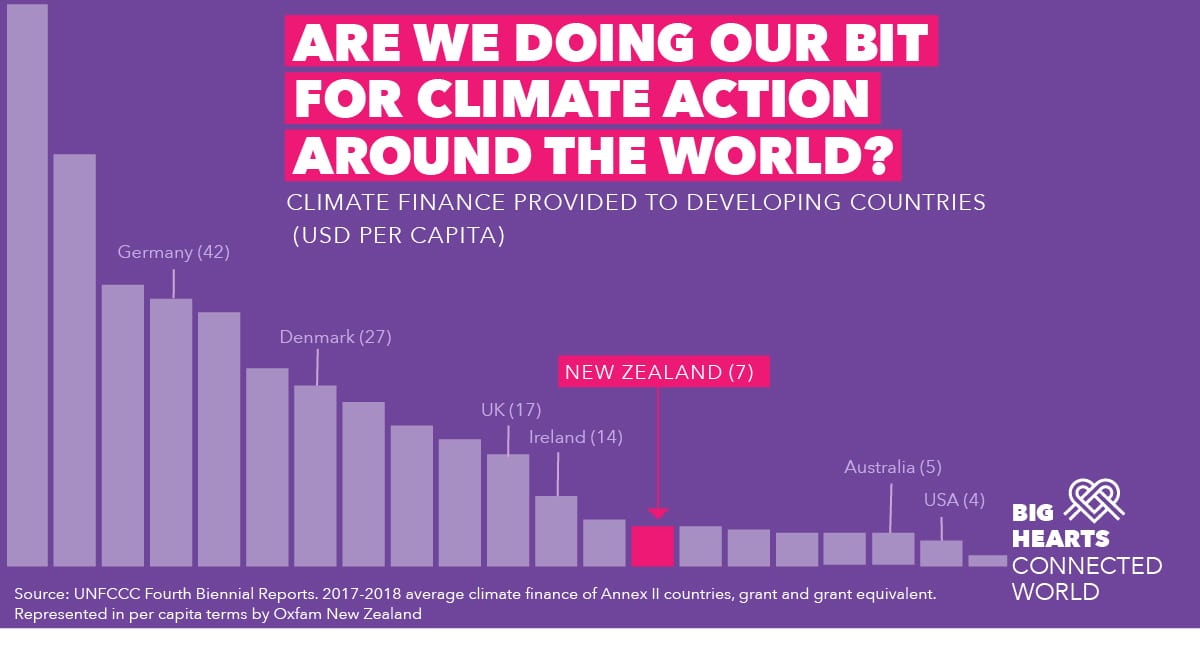New Zealand’s efforts to tackle climate change are under fresh scrutiny as global leaders meet this weekend to announce ambitious plans to meet the challenges of the climate crisis.
An exclusive group of countries have been accepted to speak at the Climate Ambition Summit, hosted by France, the UK and the UN, via a virtual meeting on Saturday. However, New Zealand has confirmed it will not be attending as it has no substantial commitment to announce.
In the wake of the declaration of a climate emergency last week, campaigning organisations like Oxfam have been hopeful the government would move faster on new policy measures to reduce emissions, as well as to support countries most impacted by climate change with vital funding so they can cope and adapt.
Meanwhile, a new analysis from Oxfam published today reveals New Zealand’s carbon emissions are disproportionately adding to the climate crisis when compared to the emissions of the majority of the world’s population.
It shows many communities experiencing the consequences of climate change first and worst are far less responsible for emissions than the average New Zealander. It also highlights that current emissions levels are not consistent with our commitment to limit global heating to less than 1.5 degrees Celsius for humanity’s best chance of survival:
- New Zealanders’ carbon footprint is more than 13 times that of the global poorest 50% (9.3 vs 0.69 tCO2/year).
- The consumption of New Zealanders produces 4 times as much carbon emissions as the consumption of citizens of the Pacific Islands (8.6 vs 2.2 tCO2/year), where climate breakdown is being seen in rising sea levels, ferocious cyclones and disrupted weather patterns.
- The per capita footprint of New Zealanders is over 4 times the 1.5C-consistent target for 2030 (9.3 tonnes vs 2.1 tonnes of CO2). This means that the average footprint will need to be reduced by at least 77% in less than a decade if we are to address the climate crisis.
Oxfam has been calling on the government to greatly enhance its 2030 emissions reduction target under the Paris Agreement, and to double New Zealand’s climate finance contributions to fund mitigation and adaptation efforts in poorer countries.
A Pacific leaders’ meeting this evening, which New Zealand is expected to attend, has also been convened, where the leaders of the climate-vulnerable islands will demand urgent worldwide action.
Oxfam New Zealand’s Campaigns Lead Alex Johnston said: “Our outsized contribution to climate change is unacceptable, and the government has to be doing everything it can to get emissions down, and increase climate finance for those on the frontlines of climate change.
“If we want to go into regional and global forums such as the ones in coming days with our head held high, we have a long way to go. This government has the right intention to take action, but isn’t going far enough. To start with, we should dramatically upscale our 2030 emissions reduction target, and double our climate finance contributions within a rising aid budget.
“This builds on the urgency for what we have to do not just to be consistent with 1.5 degrees, but to go further than that to address our outsized contribution to the problem. It is a matter of global equity,” said Johnston.
Oxfam in the Pacific Regional Director, Raijeli Nicole said: “We know that climate change is not an issue we can afford to drag our feet on. New Zealand Prime Minister, Jacinda Ardern, answered the Pacific region’s global call to action when she recently declared a climate emergency.
“We hope the New Zealand Government can back its commitment with inclusive and just policy changes that reflect the seriousness of the issue and their obligations under the Paris Agreement. The Climate Ambition Summit this Saturday provides the perfect platform for New Zealand and the international community to significantly step-up its efforts on climate change for the future of our region and of humanity.”
Notes to editors:
- Two recent Oxfam reports ‘A Fair 2030 Target for Aotearoa’ and ‘Standing With The Frontlines’ showed how far away New Zealand’s current targets are from doing its fair share for keeping to 1.5 degrees; and what New Zealand ought to be providing in climate finance to support developing countries to adapt to the impacts they are facing and mitigate their emissions.
- Data for the carbon footprint of New Zealanders is taken from Stats NZ, who use OECD estimates.
- Data for the carbon footprint for the poorest 50% of the global population and for consistency with 1.5 degrees was taken from ‘The Carbon Inequality Era’, a September 2020 report by Oxfam International and the Stockholm Environment Institute, which assesses the consumption emissions of different income groups between 1990 and 2015.
- The estimate of the consumption emissions for the Pacific Islands assumes that the consumption emissions are 1.5 the production emissions. This is based on the comparison of consumption and production emissions of other developing island states. Production emissions are taken from the Carbon Atlas.
For more information or to arrange an interview, please contact:
Kelsey-Rae Taylor on [email protected] or +6421 298 5894.







